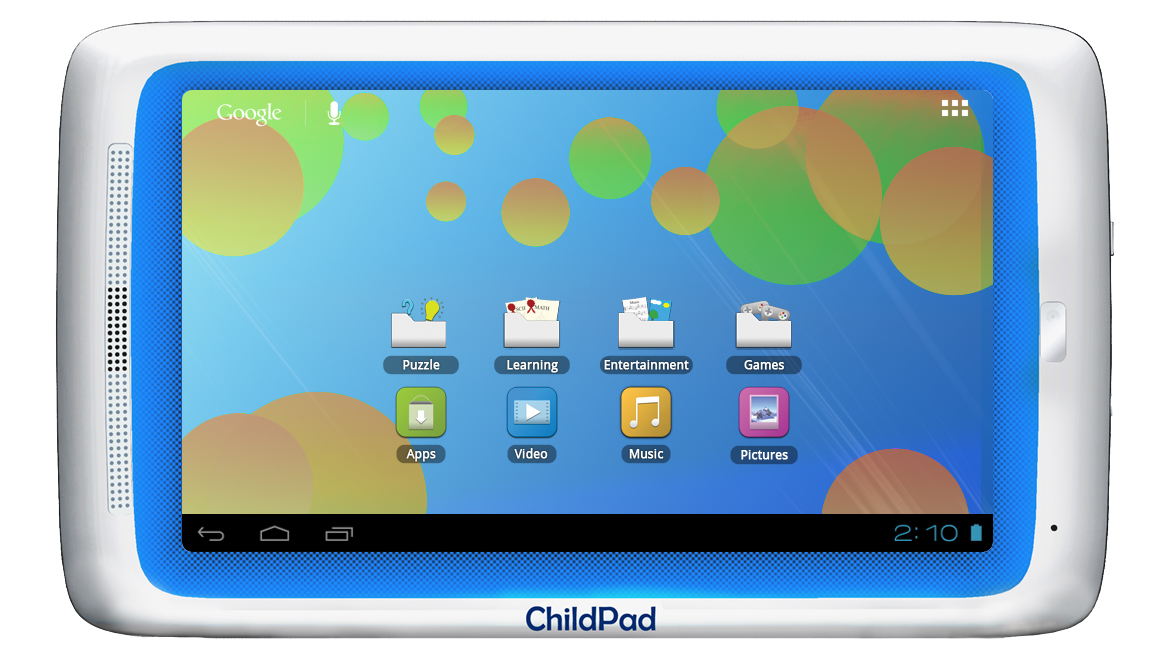Why you can trust TechRadar
Don't be fooled by the name; the Archos ChildPad gets its child-friendly moniker as much through its use of bright white and blue plastic as its does from (apparently) kid-centric software, though we were (eventually) impressed by its Mobile Parental Filter app.
We liked
Having a nice, bright colour scheme is perhaps a tad predictable for a child-centric tablet, but it makes a cheery change from those super-serious gloss black tablets that dominate the adult market. All tablets are toys, and this at least looks like one.
Once the Mobile Parental Software is set up and operating, it successfully blocks dodgy websites and is easy enough to tinker with. Meanwhile, digital file support is nothing short of awesome - it even supports hi-def MKV files and lossless music files such as FLAC and OGG - while the large selection of pre-installed and smooth-running games, including Angry Birds, does the job.
Best of all, though, is the Archos ChildPad's low price of £99.99 (around US$150/AU$146), which at last makes it affordable and practical to get your kid the gadget they've been desperate for.
We disliked
We're not totally convinced by the Archos ChildPad. Is the Android OS made for kids? No, it's not - it's far too fussy and illogical - and nor is the Archos ChildPad designed with kids in mind.
The bugs in the Mobile Parental Software are alarming, while the short battery life isn't much help. Minor grumbles about the quality of the screen, the simply awful built-in speaker, the poor camera and the lack of GPS or Bluetooth aside, we do consider the Archos ChildPad a rather heavy device that isn't up to scratch.
Its single core processor just about copes with Android ICS, games and browsing, though it's slightly hamstrung by its touchscreen's lack of tap-sensitivity.
Final verdict
We can't help thinking that there's a huge gap in the market for a good tablet with a child-specific OS that's designed for kids yet easy for a parent to control. The Archos ChildPad, however, isn't that device - and Android isn't that OS (though you may be able to tinker to make Android child-friendly).
Seeming a bit too heavy for the age group it's aimed at - primarily the under 10s - Android proves rather too fussy for younger age groups after easy and logical access. We would have liked to have seen a far more comprehensively modified version of Android, with extensive options for parental-controlled micro-customisation.
With its effective - though possibly buggy - Mobile Parental Software (an app that's cheaper here than if downloaded from Google Play to, say, a Google Nexus 7) disallowing free access of the whole internet, the Archos ChildPad does fulfil its minimum brief. We're just not convinced that elsewhere there's anything particularly child-centric about the design and spec of this tablet.
Taking away access to Google Play is a nonsense; instead the Mobile Parental Filter should be able to cope with its contents and filter appropriately, or ban access to pay-for apps.
We're also rather concerned about its low-resolution screen and terrible, awful built-in speaker; the Archos ChildPad desperately needs Bluetooth to stream to a wireless speaker accessory.
However, while the Archos ChildPad may not be the most advanced tablet computer available, it's not meant to be, and as a way to bring the world of the touchscreen tablet into a child's life for relatively little spend, the Archos ChildPad is a decent, fair value attempt. But it won't stop your child from nagging you for an iPad mini.
Jamie is a freelance tech, travel and space journalist based in the UK. He’s been writing regularly for Techradar since it was launched in 2008 and also writes regularly for Forbes, The Telegraph, the South China Morning Post, Sky & Telescope and the Sky At Night magazine as well as other Future titles T3, Digital Camera World, All About Space and Space.com. He also edits two of his own websites, TravGear.com and WhenIsTheNextEclipse.com that reflect his obsession with travel gear and solar eclipse travel. He is the author of A Stargazing Program For Beginners (Springer, 2015),

